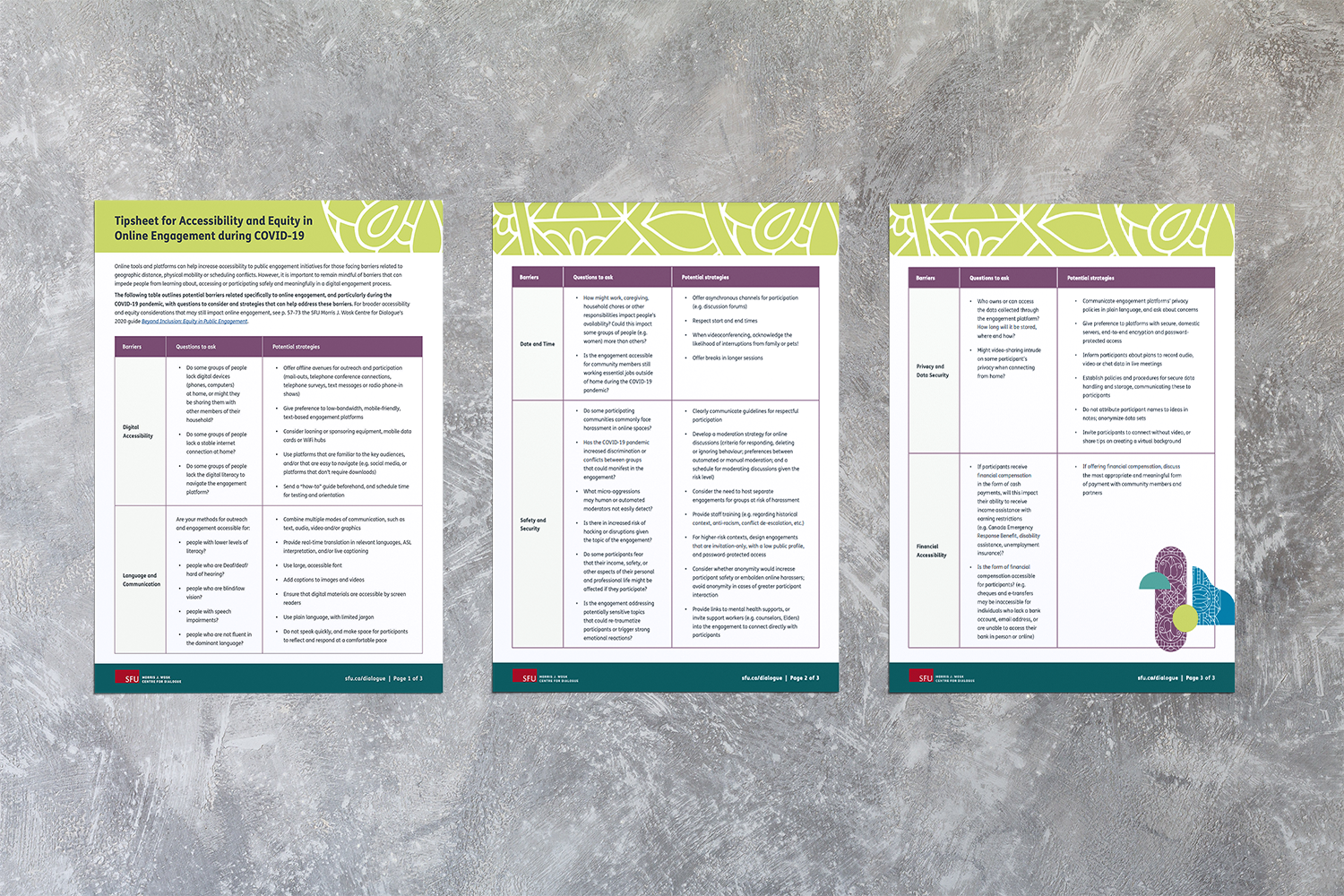- About
- People
- What We Do
- Public Programming
- Initiatives
- When the Map Is Useless
- Cities + Climate
- Mitigating Wildfire
- Moving in a Livable Region
- The Dialogue on Technology Project (DoT)
- Urban Resilient Futures Burnaby
- Action on Climate Team
- Clean Energy Canada
- Hey Neighbour Collective
- New Economy Canada
- Renewable Cities
- Renovate the Public Hearing
- SFU Demshot Challenge
- Signature Events
- Jack P. Blaney Award for Dialogue
- Award Recipients
- 2024/25: Bringing Justice Home with Judge Abby Abinanti
- 2021/22: Reimagining Social Justice and Racial Equity with adrienne maree brown
- 2019/20: Climate Change and Human Rights with Sheila Watt-Cloutier
- 2017/18: Peace, Pluralism and Gender Equality with Alice Wairimu Nderitu
- 2015/16: Climate Solutions with Tim Flannery
- 2013/14: Reconciliation with Chief Robert Joseph
- 2011/12: Twelve Days of Compassion with Karen Armstrong
- 2009/10: Widening the Circle with Liz Lerman
- 2005: Corporate Social Responsibility and the Right to Health with Mary Robinson
- 2002: Environmental Sustainability with Maurice Strong
- Nomination Details
- History of the Award
- Award Recipients
- Bruce & Lis Welch Community Dialogue
- 2026: Economics for the People: Inside Inequality with Mohsen Javdani
- 2024: AI: Beyond the Hype—Shaping the Future Together with Stephanie Dick and Daniel Barcay
- 2022: Facing the Flames: New and Old Ways of Co-Existing with Fire with Joe Gilchrist and Paul Hessburg
- 2021: All My Relations: Trauma-Informed Engagement with Karine Duhamel
- 2019: Power of Empathy with Kimberly Jackson Davidson
- 2019: Rethinking BC Referendums with John Gastil
- 2017: Strengthening Democratic Engagement with Valerie Lemmie
- 2015-16: THRIVE! Surrey in 2030
- 2014: Citizen Engagement and Political Civility with Dr. Carolyn J. Lukensmeyer
- 2013: Building a Culture of Participation with Dave Meslin
- 2012: Riots and Restorative Justice with Dr. Theo Gavrielides
- 2011: Growing Out of Hunger with Will Allen
- 2010: The Age of Unequals with Richard Wilkinson
- Jack P. Blaney Award for Dialogue
- Dialogue Training
- Consulting Services
- Services
- Our Projects
- Burnaby Community Assembly
- Centering Equity and Inclusion in an Engagement Framework
- Framework for Diabetes in Canada
- COVID-19 and Public Health: The Faith and Spiritual Leaders Dialogue Series
- Burnaby Business Recovery Task Force
- CleanBC Job Readiness Workshops
- Your Voice. Your Home.
- Perspectives on Reconciliation
- Establishing a Chinese-Canadian Museum
- Citizen Dialogues on Canada’s Energy Future
- Clients and Partners
- Get in Touch
- Knowledge & Practice
- Shared Learning
- News
- Give
Equity in Public Engagement: A Guide for Practitioners
Inclusion is integral to ethical and effective public engagement. Hearing from people with diverse lived experiences leads to more innovative ideas, better decisions and stronger democracies. However, many groups of people remain under-represented in engagement processes due to systemic barriers and inequities.
Beyond Inclusion: Equity in Public Engagement proposes eight principles to support the meaningful and equitable inclusion of diverse voices in public engagement processes across sectors.
Simon Fraser University’s Morris J. Wosk Centre for Dialogue developed the Beyond Inclusion guide through a participatory research and consultation process from 2019 to 2020 involving community members, engagement practitioners and representatives from governments and civil society. While we began with a framework of inclusion, participants emphasized the importance of equity—building reciprocal relationships and sharing power with communities to co-create accessible and meaningful engagement processes.
Download your free copy of the Beyond Inclusion guide to learn more about these principles alongside:
- Concrete strategies to help enact these principles and address barriers
- Suggested approaches to common challenges practitioners face
- Real-world case studies illustrating the principles in action
- A discussion of what inclusion, equity and accessibility mean within public engagement
- A list of further resources to support inclusive engagement
Additional Resources
The Eight Principles
Principle 1:
Invite participation within an authentic and accountable engagement process
Principle 2:
Plan early and proactively
Principle 3:
Establish respectful relationships with Indigenous Peoples
Principle 4:
Engage the internal diversity of a community
Principle 5:
Work in reciprocal relationships with communities
Principle 6:
Tailor engagement plans to the context
Principle 7:
Commit to ongoing learning and improvement
Principle 8:
Advance systemic equity
Beyond Inclusion Team
Primary author
Nicole Armos
Graphic design
Sabrina Azaria
Illustrations
Sandeep Johal
Lead project manager
Grace Lee
Peer reviewers
- Darine Benkalha
- Rain Daniels
- Karin Fuller
- Ginger Gosnell-Myers
- Lauren Howard
- Joy Johnson
- Thomas Kearney
- Ruth Mojeed
- Robin Prest
- Jennifer Reddy
- Jewelles Smith
Project support, facilitation and advising
- Elodie Jacquet
- Robert Daum
- Ginger Gosnell-Myers
- Robin Prest
- Cicely Blaine
- Diane Finegood
- Joanna Ashworth
- Kareen Wong
- Janani Ravikularam
- Anurag Balasubramanian
- Alice Muthoni Murage
The Centre for Dialogue also thanks those who contributed their time, experience and knowledge as participants in focus groups and roundtables during the research and consultation process. Unless otherwise attributed, quoted statements in this report are drawn from notes taken at these sessions, which were anonymized to encourage free dialogue and critical reflection. Although notetakers strived to stay true to the language used by participants, not all quotes necessarily represent verbatim statements from participants, and the authors have made minor corrections for grammar and syntax. This project was made possible, in part, by the SFU Centre for Dialogue Endowment
Dialogue Dispatch
SIGN UP FOR OUR COMMUNITY OF PRACTICE NEWSLETTER
Dialogue Dispatch is our community of practice newsletter where we share updates on our team's knowledge exchange activities alongside inspiring case studies, suggested readings and practical tools for people and organizations working to transform the field of democratic participation.
Read the most recent Dialogue Dispatch issue:


